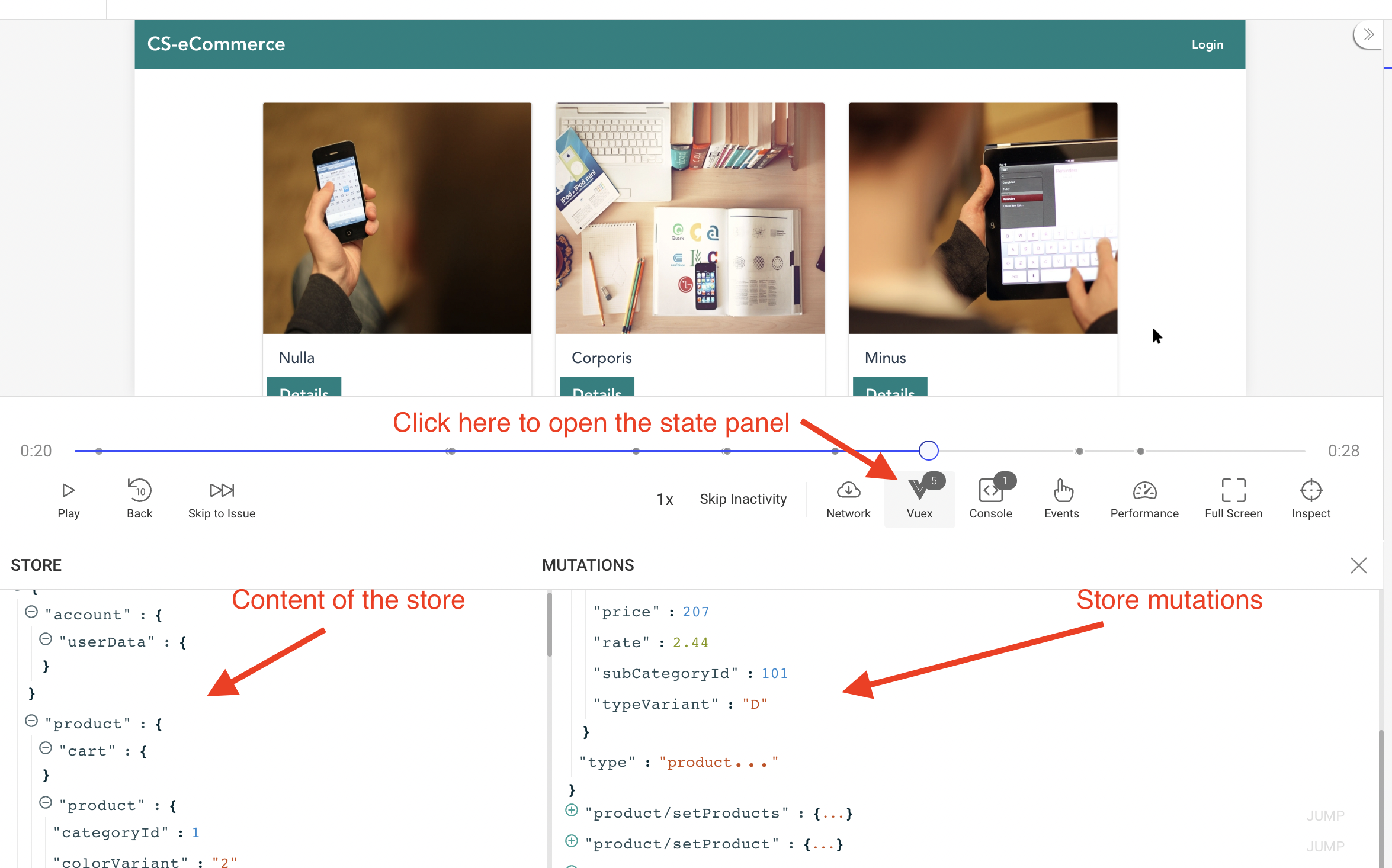Using the VueX Plugin to capture state changes
If you’re using VueX to manage the state of your Vue-based apps, then integrating OpenReplay’s plugin to track the state updates is very simple.
If you’d like to follow along, use the code published here.
Integrating the Tracker into your code
Section titled Integrating the Tracker into your codeThe first thing we need to worry about is integrating OpenReplay’s tracker into the project. We’re dealing with a Vue-based project, which means our entry point will be the main.js file. First install the tracker with:
yarn add @openreplay/trackerOr use npm if you prefer:
npm install @openreplay/trackerWith that out of the way, once you’ve set up the project inside the platform, get the project KEY and save it inside a .env file located at the project’s root.
VUE_APP_OPENREPLAY_PROJECT_KEY=<your project key here>Notice the name of the env variable. It starts with VUE_APP_ because when we do that, WebPack will replace its value wherever we use the code process.env.VUE_APP_OPENREPLAY_PROJECT_KEY to keep us from having to ship the actual configuration file to the client.
Now, inside your src folder, create a tracker folder and an index.js file inside it. This file will export a single function: startTracker which will configure everything and get the tracker started.
import Tracker from '@openreplay/tracker';
import {v4 as uuidV4} from 'uuid'
function defaultGetUserId() {
return uuidV4()
}
export function startTracker(config) {
console.log("Starting tracker...")
const getUserId = (config?.userIdEnabled && config?.getUserId) ? config.getUserId : defaultGetUserId
let userId = null;
const trackerConfig = {
projectKey: config.projectKey
}
const tracker = new Tracker(trackerConfig);
const pluginReturns = {}
Object.keys(config?.plugins).forEach( pk => {
pluginReturns[pk] = tracker.use(config?.plugins[pk]())
})
if(config?.userIdEnabled) {
userId = getUserId()
tracker.setUserID(userId)
}
console.log("tracker: user id: ", userId)
tracker.start();
return {
tracker,
userId,
...pluginReturns
}
}What you have to worry about now is that this function is doing everything you need. All you have to do is to pass the project key when calling it. Like this (from the main.js file):
import {startTracker} from './tracker/index'
let {vuexTracker} = startTracker({
projectKey: process.env.VUE_APP_OPENREPLAY_PROJECT_KEY,
})As we’ve already seen, the line process.env.VUE_APP_OPENREPLAY_PROJECT_KEY will be replaced by your actual project key when rendering the page.
Now, let’s add the VueX plugin so we can also start tracking state changes.
Adding the VueX plugin
Section titled Adding the VueX pluginThe plugin is easily installed with a single line:
yarn add @openreplay/tracker-vuexAfter that, we can import it into our code, and pass it as part of the configuration object to the startTracker function.
Go back to the definition of that function, and notice how we already have code to handle plugins. In fact, the plugins element of the configuration is a map that receives the plugins (with a key of our choice) and returns whatever we get back from calling the use method, also, on the same key we used for the plugin.
Let me show you, this is again, on the main.js file:
//your other imports go here...
import trackerVuex from '@openreplay/tracker-vuex';
import store from './store'
let {vuexTracker} = startTracker({
userIdEnabled: true,
projectKey: process.env.VUE_APP_OPENREPLAY_PROJECT_KEY,
plugins:{
'vuexTracker': trackerVuex
}
})
new Vue({
router,
store: store([vuexTracker]),
render: h => h(App)
}).$mount('#app')Notice how we’re:
- Calling the
startTrackerfunction with thepluginsmap. The string “vuexTracker” is something I came up with at the time, but you can use any string here. - We’re destructuring the response and getting the key “vuexTracker” (the same key we used for the map). As long as these two keys match, you can use any string.
- We’re passing the
vuexTrackerfunction as a parameter to thestorefunction.
The vuexTracker variable essentially contains our VueX plugin, this plugin will be hooked into the VueX store and for that we use the following code:
import Vue from 'vue'
import Vuex from 'vuex'
import account from './account'
import product from './product'
Vue.use(Vuex)
export default function (plugins = []) {
return function() {
const Store = new Vuex.Store({
modules: {
account,
product
},
strict: process.env.DEV,
plugins
})
return Store
}
}The above snippet is your standard code for setting up a store, we just added the ability to configure plugins to make sure we can track what happens to the state in our application.
Once this is ready, you should see a new VueX option inside the session replays, like this:

Have questions?
Section titled Have questions?You can check out this repository for the complete source code of a working application using VueX with the Tracker.
If you have any issues setting up the Tracker or the VueX plugin on you project, please contact us on our Slack community and ask our devs directly!